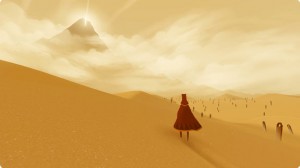Trending
Opinion: How will Project 2025 impact game developers?
The Heritage Foundation's manifesto for the possible next administration could do great harm to many, including large portions of the game development community.

Featured Blog | This community-written post highlights the best of what the game industry has to offer. Read more like it on the Game Developer Blogs or learn how to Submit Your Own Blog Post
The recent news about Tale of Tales, frames a post about art vs. products when it comes to video games, and may be a hard lesson for some to hear.

In a somewhat shocking news, infamous Indie developer Tale of Tales recently announced they are getting out of the video game market. When it comes to the concept of "art games" Tale of Tales is very much the poster child for that concept. The debate over whether or not video games are art has always annoyed me because of one not so simple statement: Video Games are art, and they are not art.

Bioshock Infinite
Whenever people have these kinds of talks, the first thing that is asked is the standard: “What is art?" question, but we're not going to be doing that, because one, this is not an art site and I am very much not an art critic. And possibly more importantly, art is subjective and that goes for whatever medium we're talking about.
Video games are an interesting medium as there are several ways of experiencing a game: You could enjoy a game for its design and mechanics and consider that art, or you could look at unique visuals or narrative and consider that art.

The Walking Dead
Video games can move and impact us just as any painting would ...Me personally, I'm on the side of design and find games like Demon's Souls, The Binding of Isaac, Mario and so on, art. Of course that's not to discount titles that focus on a narrative or visual experience; they're just not my cup of tea.
But that's the beauty of art and video games as an art form; we can have vastly different tastes and still be right.
But there is another side to both games and the Game Industry and it's time for me to possibly rain on some of your parades right now.
For added effect, please imagine me standing on a mountaintop yelling the following statement:
EVERY VIDEO GAME IS A PRODUCT
I don't care if you cried when Aerith died in Final Fantasy 7, I don't care if you were moved by Gone Home or To the Moon's story, I don't care if you grew attached to Ellie and Clementine and I don't care if Bioshock caused you to have conversations about political ideologies. A video game regardless of its purpose or functionality is always a product, and that goes for games that are portfolio pieces or those with a price tag.
A game with a price tag is a product, period; not even if the developer says otherwise. The second you put it on a storefront or sell it from your own site, that game is a product and will be viewed in comparison to other games on the market. As for portfolio pieces, your portfolio is meant to sell yourself and your skills which is another purpose of a product.

Journey
... But no matter how unique or artistic a video game is, it still has the purpose of being sold and providing an income to the team that made it.With that said, I didn't contradict the first section of this post: Video games are products, and they can be art as well. The key point however to remember is that no matter how artistic a video game is, it's still a product meant to sell something.
Great video games are those that managed to be unique, while still being able to attract people to it; whether that is by visuals, narrative, design or all of the above.
Having an idea for a video game and having one that can be sold to consumers are two different things and a harsh lesson for students and Indies starting out which takes me to the next bit of hard truth I want to talk about.
I've said this before and I'm going to say it again: The Video Game Industry can be a fun business, but it's still a business. In order to thrive in this market, you need to be able to balance the artist with the businessman. It's not just about making great games, you need to do PR, balance a budget, guide a team to produce something and all the everyday tasks of a business.
For artistic people reading this, that must sound like torture to you, but it must get done. In today's market, an Indie developer is not a strange sight anymore and everyone has their "dream idea" that they would like to get rich off of. After all my podcast discussions with developers who run their own business, the one point that has been hammered in is that you need someone on your team to understand the business side of things; either you or someone really close.

Minecraft, originally posted on TheExaminer.com
Minecraft was an amazing game that became a global success, but assuming your game will be the next Minecraft is not a sound business planReleasing games without understanding the market or PR, are ways to quickly end up without money.
Cases like Minecraft are the exception and not the rule; you can't bet the bank on your untested game idea becoming the next phenomenon. If you refuse to understand the business side of game development, I hope you have a very lucrative part time job to fall back on.
Video games are a very artistic medium and you can see that with the sheer diversity of games being made and release. With that said, if you want to thrive in this industry, you need to be able to look at things from the business side as well. It may sound great to work on one idea for five years that will be your dream project... but it's important to ask the question: “How am I going to earn money during that time?"
Going back to Tale of Tales, they have always been a unique studio and it's definitely a blow to creativity to see them leave the industry. However, this is a tough lesson for students who want to enter the industry, or even Indies who are starting their first studio with their friends: Being creative is not enough to succeed.
(Check out Game-Wisdom for posts, podcasts and daily videos on game design and the industry)
Read more about:
Featured BlogsYou May Also Like